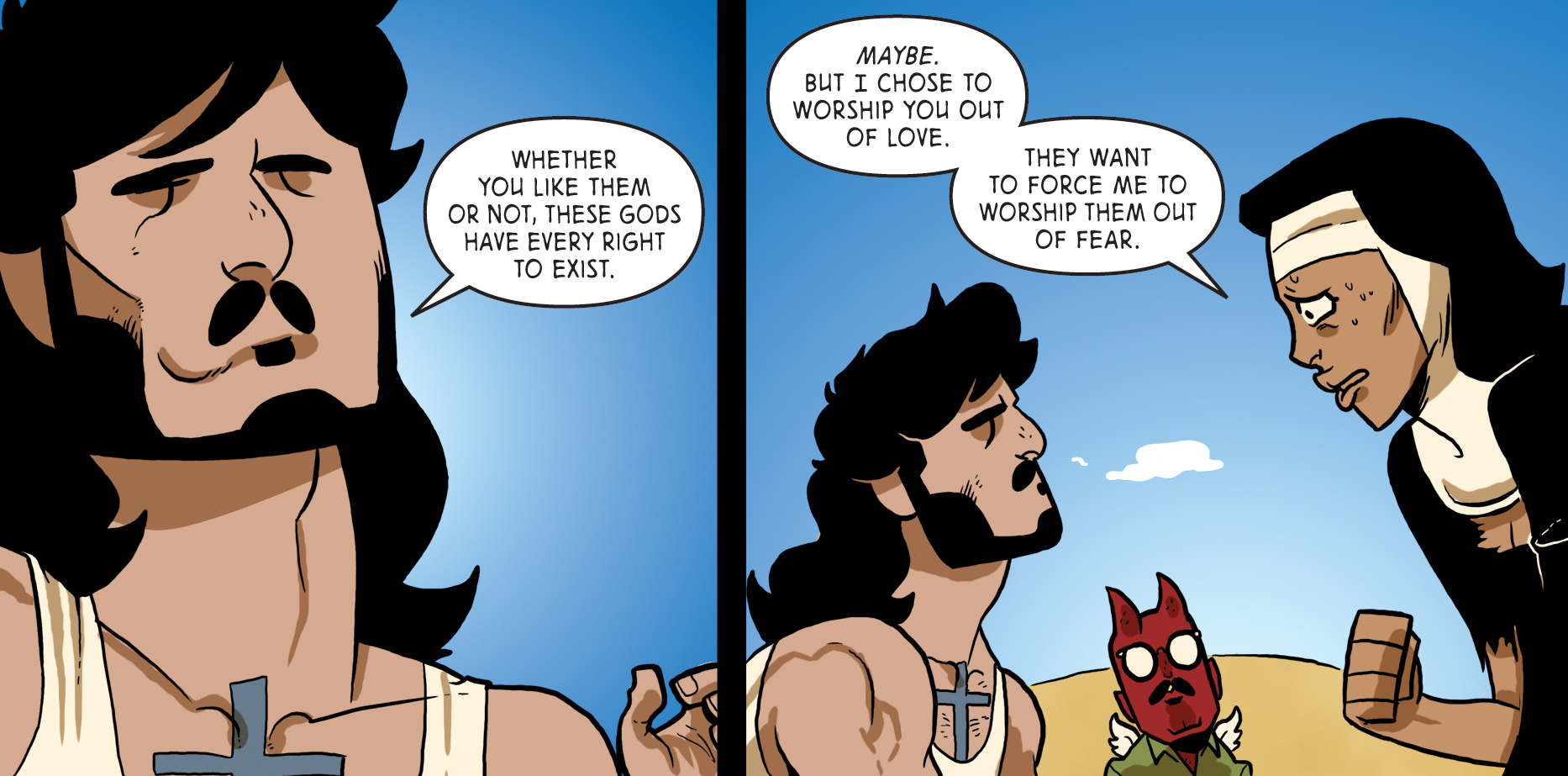 As something of a rarity in comics publishing, the third issue of Nick Marino and Daniel Arruda Massa’s Holy F*ck hits the stands this week (March 11, 2015), mere days after the previous one. As always, Sacred and Sequential and I were kindly provided with a review copy. Continuing the story of Jesus, Satan, and the nun Maria’s quest to stop Zeus and Isis’ plot to cause nuclear devastation in order to inspire humanity to have faith in them (and a cadre of other old gods who have remained more or less peripheral throughout the series) once more, this issue shows the gods finally get their plan crowdfunded through the website Kickslammer.
As something of a rarity in comics publishing, the third issue of Nick Marino and Daniel Arruda Massa’s Holy F*ck hits the stands this week (March 11, 2015), mere days after the previous one. As always, Sacred and Sequential and I were kindly provided with a review copy. Continuing the story of Jesus, Satan, and the nun Maria’s quest to stop Zeus and Isis’ plot to cause nuclear devastation in order to inspire humanity to have faith in them (and a cadre of other old gods who have remained more or less peripheral throughout the series) once more, this issue shows the gods finally get their plan crowdfunded through the website Kickslammer.
Although the plot moves forward at slightly faster clip than in #2, many of the problems I had with the previous two issues remain. Characterization is still rather flat and inconsistent, events are sometimes poorly connected to each other, and things that seem to move the story forward or to develop a character turn out to have little lasting influence. Again, the book is sprinkled with amusing gags. The opening gag this time, for example, giving author credits to Marina and Arruda Massa but crediting God as creator of Jesus and Satan, is a good one. And Jesus’ lengthy muttering about the complexity of the knots with which the hostage Maria has been tied to a pole is my kind of dry.
Again, the intertextual orbit broadens to make room for some additional gags, this time already on the second page with a manga- or anime-inspired touch: Jesus’ martial arts moves are named in large captions. Thus, when he punches Isis in the face, a brown-and-pink design flashes “Fist to the Face.” When he knees Zeus in the groin, “Knee to the Nuts.” While also dry, this does little for me. As with my complaints about the last issue, it feels forced. And, to return as an aside to last week’s review, Satan’s UFO does return for a few panels, exactly long enough to serve as a deus ex machina (no pun intended), before crashing. Finally, it is worth mentioning that Zeus and Isis make an appearance on a daytime talk show hosted by a bug-eyed Helen DeGenerate. Sure, it’s an easy pun, but for a comic purporting to be religious satire, it comes uncomfortably close to playing into the Religious Right’s hands.

But this issue does return to the (perhaps somewhat banal) critical thinking about religion that could be gleaned in the first one but was largely missing in the second. When Jesus and Satan are about to give up, Maria gets angry. Jesus argues that, at the very least, they are not false gods and have every right to exist. “Maybe,” replies the nun, “[b]ut I choose to worship you out of love. They want to force me to worship them out of fear. And I won’t do that.” Again, of course, the sense that there’s nothing new under the sun is difficult to dismiss; this is, after all, exactly how the Goa’uld – generally based on old Egyptian gods – in Stargate SG-1 were portrayed.
It is unlikely that Marino and Arruda Massa are criticizing polytheisms with Holy F*ck. But, with a little effort, it is possible to read this comment and condemnation as a return to the critique of Evangelical Protestantism that I earlier saw in the first issue. If one reads Zeus and Isis less literally as Greek and Egyptian gods and instead regard them as atavistic symbols of “old time religion,” and the free-spirited Jesus and Satan as the liberal and modern (if overdone), some interesting avenues for interpretation open up. As has often been claimed, perhaps nowhere more explicitly than in historian of religions Jason Bivins’ work, conservative Evangelicalism in America has promoted a “religion of fear” and transformed American politics in what their critics see as destructive and dangerous ways. The fight, in such a reading, is not between old gods and new, but between fundamentalism and liberal theology and secular society, a battle certainly being fought in the current culture wars.
Admittedly, this might simply be me misreading the comic completely. But at least this issue contained something strong enough to inspire a peek beneath the surface, a hopeful sign that the series, as it nears its conclusion, is again tentatively slouching toward satire to be born.